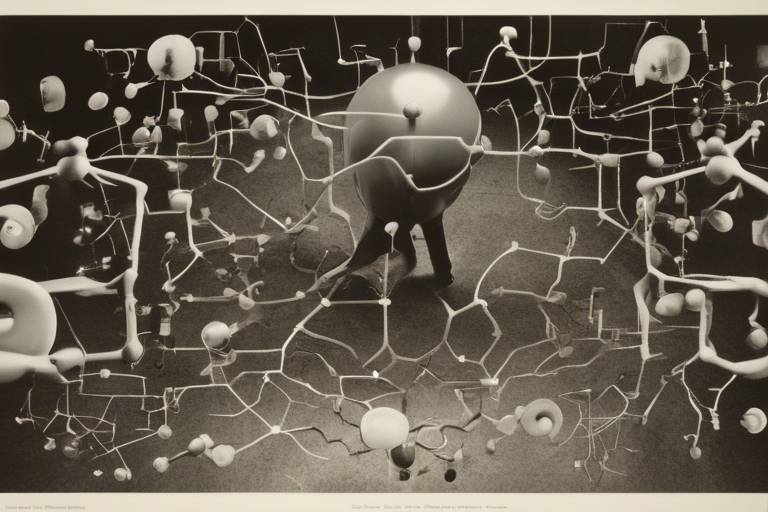Does Ontology Give Insight Into the Reality of Existence?
Ontology is a fascinating and intricate branch of philosophy that dives deep into the essence of existence itself. It’s like peeling away the layers of an onion, revealing the core of what it means to "be." But does it actually provide insight into the reality of existence? That’s a question worth pondering! As we embark on this philosophical journey, we’ll explore not just the definitions and historical perspectives of ontology, but also how it influences our understanding of the world around us.
At its core, ontology examines the fundamental categories of being and their relationships. Think of it as a map of existence, where every concept—be it a person, an object, or an idea—has its place. This mapping is crucial because it shapes how we perceive reality. For instance, when we categorize things, we create a framework that helps us make sense of our experiences. But what happens when our frameworks clash with new ideas or discoveries? This is where ontology becomes particularly relevant, as it challenges us to rethink our assumptions and expand our understanding.
Imagine you’re at a party, and someone starts talking about their favorite movie. They describe the characters, the plot twists, and the emotions it evokes. Now, think of ontology as the underlying structure that informs that conversation. It’s not just about the movie itself, but about how we categorize and understand the characters and their motivations. In this way, ontology serves as a lens through which we can view not just films, but all aspects of our reality.
Moreover, ontology doesn’t exist in a vacuum. It intersects with various disciplines, enriching our understanding of existence in numerous ways. From science to linguistics and artificial intelligence, ontological frameworks help us navigate complex questions about reality. For example, in the realm of artificial intelligence, understanding what constitutes "intelligence" or "consciousness" is deeply rooted in ontological discussions. As technology advances, these discussions become even more pertinent, raising questions about what it means to exist in a digital age.
In the following sections, we’ll delve into the historical perspectives that have shaped ontology, from the ancient Greeks to modern thinkers. We’ll explore how these ideas have evolved and continue to influence contemporary discussions about existence. So, grab your philosophical hat, and let’s dive deeper into the captivating world of ontology!
- What is ontology? Ontology is the philosophical study of the nature of being, existence, and reality.
- How does ontology relate to other disciplines? Ontology intersects with fields like science, linguistics, and artificial intelligence, providing frameworks that enhance our understanding of various concepts.
- Why is ontology important? It helps us categorize and make sense of our experiences, shaping our perceptions of reality.
- Who are some key figures in ontology? Notable philosophers include Plato, Aristotle, Sartre, and Heidegger, each contributing to the evolution of ontological thought.

The Definition of Ontology
Ontology is a fascinating branch of philosophy that dives deep into the fundamental questions of existence. At its core, ontology seeks to understand what it means to "be." It explores various concepts such as being, becoming, existence, and reality. Think of ontology as the philosophical lens through which we view the world, helping us make sense of everything from the simplest objects to the most complex ideas. It’s like trying to unravel a giant ball of yarn, where each thread represents a different aspect of existence.
To break it down further, ontology can be seen as a framework that categorizes entities and their relationships. It answers questions like: What is the nature of reality? What entities exist? How do these entities interact with one another? In essence, ontology helps us map out the landscape of existence, allowing us to distinguish between what is real and what is merely a construct of our minds.
In the realm of ontology, there are several key concepts that are crucial for understanding its implications:
- Being: Refers to the state of existence or the nature of entities.
- Existence: The condition of being real or having an actual presence.
- Reality: The totality of all that is, encompassing both physical and abstract entities.
- Essence: The intrinsic nature or indispensable quality of something that determines its character.
Ontology is not just an abstract concept; it has practical implications in various fields. For instance, in science, ontology helps define categories of entities that researchers study, such as living organisms, physical objects, and even concepts. In artificial intelligence, ontological frameworks are used to create models of knowledge that machines can understand and process. This intersection of ontology with other disciplines demonstrates its vital role in shaping our comprehension of existence.
In summary, ontology serves as a foundational pillar in philosophy, providing insights into the nature of existence and reality. By examining the relationships between different entities and their characteristics, ontology enriches our understanding of the world around us. Whether we are pondering the existence of abstract concepts or the physical world, ontology equips us with the tools to explore these profound questions.

Historical Perspectives on Ontology
Ontology has a rich and intricate history that stretches back to the dawn of philosophical inquiry. To truly appreciate the depth of this field, one must explore the contributions of key thinkers who have shaped our understanding of existence. From the ancient Greeks to modern philosophers, each has left an indelible mark on the landscape of ontology. This journey through time reveals not only the evolution of thought but also the persistent questions that have fueled ontological debates.
In ancient Greece, philosophers like Plato and Aristotle laid the groundwork for ontological discourse. Plato introduced the idea of the Theory of Forms, suggesting that the physical world is merely a shadow of a higher reality composed of abstract forms. For Plato, these forms represented the most accurate understanding of existence, leading to profound implications for knowledge and reality. His allegory of the cave illustrates how most people perceive only illusions rather than the true essence of things.
On the other hand, Aristotle took a different approach. He emphasized the concept of substance as the fundamental reality. For Aristotle, substances are not just abstract ideals but tangible entities that possess essence and existence. His focus on empirical observation and categorization of beings laid the foundation for a more scientific approach to ontology. The contrast between Plato’s idealism and Aristotle’s realism sparked a rich dialogue that continues to resonate today.
As we move forward in time, the Middle Ages saw the rise of Scholasticism, where philosophers like Thomas Aquinas integrated Aristotelian thought with Christian theology. This synthesis brought forth discussions about the nature of being and existence in relation to God, further complicating ontological questions. The Renaissance reignited interest in humanism and the individual, setting the stage for modern philosophical inquiry.
In the 17th and 18th centuries, thinkers such as Descartes and Leibniz introduced new dimensions to ontology. Descartes famously declared, "I think, therefore I am," emphasizing the role of consciousness in establishing existence. Leibniz, with his concept of monads, proposed that reality is composed of simple substances that reflect the universe in their own unique way. These ideas further enriched the ontological landscape, paving the way for future explorations.
Fast forward to the 19th and 20th centuries, where existentialism emerged as a powerful philosophical movement. Thinkers like Sartre and Heidegger shifted the focus from abstract forms and substances to the lived experience of individuals. They argued that existence precedes essence, emphasizing the importance of personal choice and responsibility. This existential turn challenged traditional ontological frameworks and opened new avenues for understanding the complexities of being.
In summary, the historical perspectives on ontology reflect a tapestry of ideas woven by influential philosophers across centuries. Each thinker contributed to a broader understanding of existence, shaping the questions we continue to grapple with today. The dialogue between different ontological theories reveals the dynamic nature of this field, inviting us to explore the very essence of reality.
- What is ontology? Ontology is the philosophical study of the nature of being, existence, and reality.
- Who are the key figures in the history of ontology? Key figures include Plato, Aristotle, Descartes, and existentialist thinkers like Sartre and Heidegger.
- How does ontology relate to modern philosophy? Ontology continues to inform contemporary debates in philosophy, science, and other disciplines, shaping our understanding of existence and reality.

Plato's Theory of Forms
Plato's Theory of Forms is one of the cornerstones of his philosophical thought, presenting a fascinating perspective on reality that continues to resonate through the ages. According to Plato, the material world we perceive with our senses is merely a shadow of a higher reality composed of abstract, perfect forms or ideas. Imagine walking through a gallery where every painting is a reflection of an ideal form, but the actual paintings themselves are imperfect and transient. This analogy captures the essence of Plato's view: the real essence of things exists beyond our sensory experiences.
In Plato's ontology, these forms are not just mere concepts; they are the true essence of all things. For instance, consider the concept of beauty. According to Plato, while we may encounter beautiful objects in the world, these objects are merely imperfect representations of the ultimate Form of Beauty. This Form is unchanging, eternal, and exists independently of the physical manifestations we encounter in our daily lives. Plato believed that understanding these forms leads us to a deeper comprehension of reality itself.
To further illustrate this theory, let’s break down some key aspects of Plato's Forms:
- Abstract Reality: Plato posited that Forms exist in a realm distinct from the material world, accessible only through intellectual reasoning.
- Immutability: Unlike physical objects, which are subject to change and decay, Forms are eternal and unchanging.
- Perfection: Forms represent the perfect version of concepts, embodying the highest standard against which all physical objects are measured.
Plato's allegory of the cave serves as a powerful metaphor for his Theory of Forms. In this allegory, prisoners are confined in a cave, only able to see shadows cast on a wall by objects behind them. These shadows represent the distorted reality of the material world. When one prisoner escapes and discovers the outside world, he realizes that the shadows are mere illusions, and he encounters the true forms of objects illuminated by the sun. This journey symbolizes the philosopher's quest for knowledge, moving from the realm of appearances to the realm of reality.
Despite its profound implications, Plato's Theory of Forms has faced criticism over the centuries. Philosophers like Aristotle challenged the existence of these abstract entities, arguing that they were unnecessary to explain the nature of reality. Aristotle believed that forms do not exist separately from the objects themselves but are inherent within them. This debate between Plato and Aristotle highlights the ongoing struggle to understand existence and the nature of reality, influencing countless philosophical discussions thereafter.
In summary, Plato's Theory of Forms invites us to question the nature of reality and existence. It encourages a deeper exploration of the concepts that shape our understanding of the world. By contemplating the ideal forms, we can aspire to grasp the essence of truth and beauty, transcending the limitations of our sensory experiences. In this light, ontology becomes a gateway to uncovering the mysteries of existence, challenging us to look beyond the surface and seek the underlying truths that define our reality.

Aristotle's Substance Theory
Aristotle's Substance Theory is a cornerstone of his philosophical framework, offering a profound insight into the nature of reality. Unlike his teacher Plato, who emphasized abstract Forms as the ultimate reality, Aristotle grounded his philosophy in the tangible world. He proposed that substances are the fundamental entities that exist independently and possess a distinct essence. In Aristotle's view, a substance is not merely a collection of properties or characteristics; it is a unique entity that has its own identity and existence.
To better understand Aristotle's perspective, let's break down his concept of substance into its core components:
- Essence: This refers to what a substance is at its core. For Aristotle, every substance has an essence that defines its nature and differentiates it from other substances.
- Existence: While essence describes what something is, existence pertains to the fact that it is. Aristotle believed that understanding a substance involves recognizing both its essence and its existence in the world.
- Substance vs. Accident: Aristotle distinguished between substances and accidents. Accidents are properties that can change without altering the substance itself. For example, the color of a car (an accident) can change, but it remains a car (the substance).
Aristotle categorized substances into two main types: primary substances and secondary substances. Primary substances are individual entities, such as a specific tree or a particular person. Secondary substances, on the other hand, refer to the species or genus to which primary substances belong, like 'tree' or 'human.' This classification underscores Aristotle's belief that understanding the world requires a recognition of both individual entities and their broader classifications.
Moreover, Aristotle's substance theory has significant implications for metaphysics and ontology. It challenges us to consider the relationship between essence and existence. Are there universal truths that apply to all substances, or is each substance unique in its essence? This inquiry leads to deeper discussions about the nature of reality itself.
In contemporary philosophy, Aristotle's ideas resonate in various fields, including science and ethics. For instance, in biology, the classification of living organisms often reflects Aristotelian principles, as scientists categorize species based on their essential characteristics. Similarly, ethical discussions about human nature often draw on Aristotle's notion of essence to explore what it means to live a good life.
In conclusion, Aristotle's Substance Theory not only provides a framework for understanding the nature of existence but also invites ongoing dialogue about the essence of reality. It compels us to reflect on the fundamental questions of what it means to be and how we categorize the world around us. By examining substances and their properties, we gain deeper insights into our own existence and the intricate web of reality we inhabit.
- What is the main difference between Aristotle's and Plato's views on reality?
Aristotle focused on tangible substances and their essences, while Plato emphasized abstract Forms as the true reality. - How does Aristotle's Substance Theory influence modern science?
Aristotle's classification of substances informs biological taxonomy and the study of living organisms, emphasizing the importance of essence in understanding life. - What role do accidents play in Aristotle's philosophy?
Accidents are properties that can change without affecting the substance's identity, highlighting the distinction between what something is and its characteristics.

Modern Ontological Theories
In the ever-evolving landscape of philosophy, modern ontological theories have emerged as a response to the complexities of existence in our contemporary world. These theories not only challenge traditional notions of being but also offer fresh perspectives that resonate with our experiences today. Among the most influential frameworks in modern ontology are **existentialism** and **realism**, each presenting unique insights into the nature of reality and our place within it.
Existentialism is a philosophical movement that emphasizes individual experience and the inherent freedom of the human condition. Thinkers like Jean-Paul Sartre and Martin Heidegger have significantly shaped this discourse, arguing that existence precedes essence. In simpler terms, this means that we are not defined by any predetermined essence; rather, we create our own identities through our choices and actions. This idea resonates deeply in a world where personal agency is increasingly valued. Sartre famously stated, "Man is condemned to be free," highlighting the weight of responsibility that comes with our freedom to choose.
On the other hand, realism posits that reality exists independently of our perceptions or beliefs. It stands in contrast to anti-realism, which suggests that the nature of reality is contingent upon our interpretations or social constructs. The debate between realism and anti-realism raises profound questions about the nature of existence itself. For instance, if reality is objective and exists outside of human perception, then how do we reconcile subjective experiences with this objective reality? This tension between subjective understanding and objective existence is at the heart of modern ontological discussions.
To better understand these modern ontological theories, let's consider their implications in various contexts:
| Theory | Key Concepts | Philosophers |
|---|---|---|
| Existentialism | Individual freedom, responsibility, existence precedes essence | Sartre, Heidegger |
| Realism | Objective reality, independence from perception | Putnam, Dummett |
| Anti-Realism | Reality is dependent on perceptions and social constructs | Kant, Berkeley |
As we explore these modern theories, it's essential to recognize how they intersect with our daily lives. For example, existentialist concepts can be seen in the way we navigate personal relationships and career choices. The idea that we are the architects of our own lives encourages a sense of empowerment and introspection. Meanwhile, realism prompts us to question the validity of our beliefs and the information we consume, urging us to seek a deeper understanding of the world around us.
Ultimately, modern ontological theories invite us to engage with the fundamental questions of existence. They challenge us to reflect on our beliefs, our experiences, and the nature of reality itself. As we delve into these philosophical discussions, we uncover layers of meaning that enrich our understanding of existence and our place within the cosmos.
- What is ontology? Ontology is a branch of philosophy that studies the nature of being, existence, and reality.
- Who are some key figures in modern ontology? Key figures include Jean-Paul Sartre, Martin Heidegger, Hilary Putnam, and Michael Dummett.
- How does existentialism differ from realism? Existentialism focuses on individual experience and freedom, while realism asserts that reality exists independently of our perceptions.
- Why is ontology important? Ontology helps us understand the fundamental nature of existence, which influences various fields such as science, linguistics, and artificial intelligence.

Existentialism and the Nature of Being
Existentialism is a philosophical movement that prioritizes individual experience and the inherent freedom of the human condition. At its core, it grapples with profound questions about existence, identity, and the essence of being. Think of it as a lens through which we can examine the chaos and beauty of life, where every individual is tasked with defining their own meaning in a seemingly indifferent universe. This philosophy challenges us to confront our own existence and the choices we make, emphasizing that we are not merely products of our environment but active participants in shaping our reality.
Key existentialist thinkers like Jean-Paul Sartre and Martin Heidegger have significantly shaped our understanding of what it means to exist. Sartre famously declared that "existence precedes essence," suggesting that we are born into the world without any predetermined purpose. This radical idea implies that it is up to each person to create their own essence through actions and choices. In contrast, Heidegger delves into the concept of "Being" itself, urging us to consider not just what it means to exist, but how we relate to our existence. He introduces the idea of Being-in-the-world, which emphasizes our interconnectedness with others and the environment.
Existentialism also challenges traditional notions of reality and truth. It posits that the subjective experience is paramount, leading to a rich tapestry of interpretations of existence. This perspective raises critical questions:
- What does it mean to truly live?
- How do our choices define us?
- Can we find meaning in a chaotic world?
These inquiries resonate deeply in our modern context, where individuals often feel overwhelmed by societal expectations and external pressures. Existentialism invites us to embrace our freedom, acknowledging that while we may not control the circumstances of our lives, we have the power to choose our responses. This empowerment can be both liberating and daunting, as it places the responsibility for our existence squarely on our shoulders.
Moreover, the existentialist focus on authenticity encourages individuals to live genuinely, aligning their actions with their true selves. In a world filled with distractions and societal norms, this pursuit of authenticity can feel like a rebellious act. It urges us to ask ourselves: Are we living for ourselves, or are we merely conforming to the expectations of others? This self-reflection is crucial for understanding our own nature of being.
In summary, existentialism provides a profound framework for exploring the nature of being. It emphasizes personal responsibility, the importance of choice, and the quest for meaning in an unpredictable world. By engaging with existentialist thought, we can gain insight into our own lives and the larger human experience, ultimately fostering a deeper understanding of what it means to exist.
1. What is existentialism?
Existentialism is a philosophical movement that emphasizes individual existence, freedom, and the search for meaning in a chaotic world.
2. Who are the key figures in existentialism?
Key figures include Jean-Paul Sartre, Martin Heidegger, Simone de Beauvoir, and Albert Camus, each contributing unique perspectives to the philosophy.
3. How does existentialism relate to the concept of freedom?
Existentialism posits that individuals are free to make choices and are responsible for the consequences of those choices, highlighting the importance of personal agency.
4. Can existentialism provide answers to life's meaning?
While existentialism does not provide definitive answers, it encourages individuals to explore their own beliefs and create personal meaning through their experiences.

Realism vs. Anti-Realism
When diving into the philosophical waters of ontology, one cannot overlook the intriguing debate between realism and anti-realism. This discourse is not just an academic exercise; it impacts how we perceive the world around us and our place within it. At its core, realism asserts that a reality exists independent of our thoughts and perceptions. In simpler terms, realism is like saying, "The tree in the forest makes a sound, even if no one is there to hear it." This perspective is grounded in the belief that objects and facts exist outside of our subjective experiences.
On the flip side, we have anti-realism, which challenges this notion by suggesting that reality is inherently tied to our perceptions and interpretations. Imagine looking at a painting: while the canvas and paint exist independently, the meaning and value we derive from it depend entirely on our individual perspectives. Anti-realists argue that without a conscious observer, the essence of existence is questionable. This perspective raises profound questions: Is reality merely a construct of our minds? Does the universe exist if there’s no one to observe it?
To better understand these contrasting viewpoints, let’s break them down into a few key aspects:
| Aspect | Realism | Anti-Realism |
|---|---|---|
| Nature of Reality | Exists independently of our perceptions | Dependent on our perceptions and interpretations |
| Truth | Objective and discoverable | Subjective and constructed |
| Examples | Scientific facts, physical objects | Art, moral values, social constructs |
This debate has significant implications in various fields, including science, ethics, and even art. For instance, in the realm of science, a realist might argue that the laws of physics exist regardless of human observation, while an anti-realist might contend that our understanding of these laws is shaped by human experience and cultural context.
Furthermore, the implications of realism and anti-realism extend beyond mere philosophical musings. They influence how we approach problems in everyday life, from ethical dilemmas to scientific inquiries. When we consider whether something is objectively true or merely a product of our subjective experience, we navigate our interactions and decisions through a lens shaped by these ontological beliefs.
In conclusion, the tension between realism and anti-realism invites us to reflect on the nature of existence itself. Are we merely observers in a universe that exists independently, or are we active participants in constructing our reality? This ongoing dialogue not only enriches our understanding of ontology but also challenges us to reconsider how we engage with the world around us.

Ontology and Other Disciplines
Ontology is not just a dry, academic pursuit; it’s a vibrant field that resonates across various disciplines, enriching our understanding of existence in profound ways. From science to linguistics and even artificial intelligence, the principles of ontology provide a framework that helps us navigate the complexities of reality. Imagine ontology as the underlying architecture of a grand building; without it, the structure would be shaky and uncertain. In this section, we’ll explore how ontology intersects with different fields and what insights it offers.
In the realm of science, ontology plays a crucial role in shaping our understanding of the natural world. For instance, when scientists categorize living organisms, they rely on ontological principles to define what constitutes a species. This classification isn’t just about naming things; it’s about understanding the very essence of life itself. The debates surrounding the nature of species—whether they are fixed entities or fluid categories—are deeply ontological in nature. This leads us to ask: What does it mean to exist as a species? Are we merely collections of genes, or is there something more?
Similarly, in linguistics, ontology influences how we understand meaning and reference. When we communicate, we are not just exchanging words; we are conveying concepts that have ontological weight. For example, consider the difference between the terms “cat” and “feline.” The former refers to a specific animal, while the latter encompasses a broader category. This distinction is rooted in ontological theories about classification and existence. Linguists often grapple with questions like: What do our words actually refer to? Are they merely labels, or do they point to real entities in the world? Such inquiries reveal the intricate dance between language and ontology.
In the world of artificial intelligence, ontology has emerged as a vital component in developing systems that can understand and process information like humans do. Ontological frameworks help AI systems categorize knowledge, making it easier for them to interpret data and respond to queries. For example, consider how a virtual assistant understands your request to “play jazz music.” It must have an ontological understanding of what “jazz” means, including its characteristics and how it relates to other genres. This is where ontology becomes a bridge between human cognition and machine learning.
To illustrate the impact of ontology across these disciplines, here’s a simple table that summarizes some key intersections:
| Discipline | Ontological Implications |
|---|---|
| Science | Classification of species and understanding of natural laws |
| Linguistics | Meaning and reference in language; categorization of concepts |
| Artificial Intelligence | Knowledge representation and data interpretation |
As we can see, ontology serves as a foundational aspect of various fields, guiding our understanding of existence and reality. Whether we’re classifying living beings, interpreting language, or programming intelligent systems, the questions raised by ontology remind us that our understanding of existence is always evolving. It’s like peeling an onion; each layer reveals more complexity and depth, challenging us to reconsider our perspectives.
- What is ontology? Ontology is the branch of philosophy that studies the nature of being, existence, and reality.
- How does ontology relate to science? Ontology helps categorize and define entities in scientific classifications, influencing how we understand natural phenomena.
- Can ontology impact artificial intelligence? Yes, ontology provides frameworks for AI systems to interpret and process information more effectively.
- Why is ontology important in linguistics? Ontological principles help clarify the meaning and reference of words, shaping our understanding of language.
Frequently Asked Questions
- What is the main focus of ontology?
Ontology primarily focuses on the study of being, existence, and reality. It seeks to understand what entities exist and how they can be categorized and related to one another. Think of it as the philosophical framework that lays the groundwork for how we perceive and interpret the world around us.
- How has ontology evolved over time?
Ontology has a rich history that spans from ancient philosophers like Plato and Aristotle to contemporary thinkers. Each philosopher contributed unique insights, shaping the ongoing discourse about existence. For instance, Plato's Theory of Forms introduced the idea of abstract realities, while Aristotle emphasized the importance of substances as the core of existence.
- What is the significance of Plato's Theory of Forms in ontology?
Plato's Theory of Forms suggests that non-material abstract forms represent the most accurate reality. This concept has profoundly influenced modern ontology by prompting discussions about the nature of reality and the distinction between the physical world and the world of ideas. It raises questions about what we consider 'real' and how we understand existence.
- How does existentialism relate to ontology?
Existentialism is a branch of philosophy that emphasizes individual experience and freedom, directly engaging with ontological questions about being. Thinkers like Sartre and Heidegger explored how personal existence shapes our understanding of reality, highlighting the subjective nature of existence and the importance of individual choice.
- What is the difference between realism and anti-realism in ontology?
The debate between realism and anti-realism revolves around the nature of reality itself. Realism posits that there are entities that exist independently of our perceptions, while anti-realism suggests that reality is dependent on our conceptual frameworks. This discussion is crucial for ontology as it influences how we approach the study of existence.
- How does ontology intersect with other disciplines?
Ontology is not just confined to philosophy; it intersects with various fields such as science, linguistics, and artificial intelligence. In science, for example, ontological frameworks help in categorizing entities and understanding their relationships. In AI, ontology assists in organizing knowledge and improving machine understanding of human concepts.


















